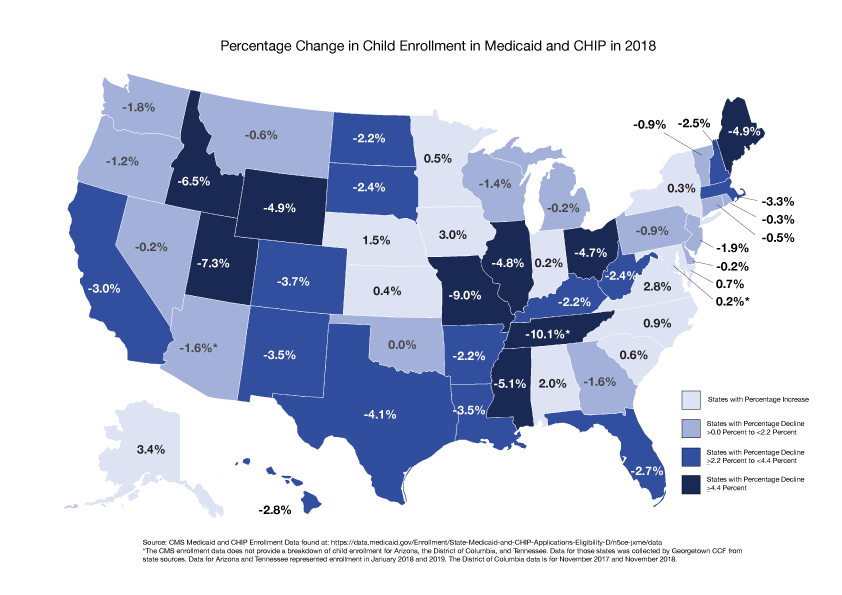CHIP
-
Call for Public Comments on Annual Review of the Core Sets of Health Quality Measures in Medicaid and CHIP
Each year, a multi-stakeholder group is selected through a nomination process to review and make recommendations on the child and adult core sets of health care quality measures in Medicaid and CHIP. This year, I was pleased to participate as a member of the workgroup, which was facilitated by a great team at Mathematica. It’s…
-
Child Enrollment in Medicaid and CHIP Slips Again
We continue to closely monitor the trends in child enrollment in Medicaid and the Children’s Health Insurance Program (CHIP) following our report on the precipitous enrollment decline in 2018. As of March 2019, overall child enrollment in Medicaid and CHIP was down an additional 41k children in the first quarter of 2019. However, the national…
-
Proposed HUD Rule Adds to Climate of Fear for Immigrant Families, Puts America’s Children at Greater Risk of Homelessness
Yesterday was the deadline for comments on yet another anti-immigrant proposed rule, this one targeting over 55,000 citizen children in mixed status families that rely on prorated housing assistance under current program rules. We joined other child health groups in submitting comments, underscoring the serious negative impacts of homelessness and housing insecurity for child well-being…
-
CMS Awards $48 Million in Outreach Funds for Children’s Coverage
Earlier this week, CMS announced that it was awarding $48 million in cooperative agreements to 39 organizations in 25 states to enroll eligible children in health coverage. Since 2009, CMS has awarded $210 million in funds to connect kids to coverage through various federal appropriation bills. Unfortunately, this latest round of grants was delayed as…
-
Weaponizing Program Integrity: A New Assault on Medicaid Expansion
CMS Administrator Seema Verma has never been a fan of the Affordable Care Act’s Medicaid expansion or the positive difference it has made in the lives of low-income Americans. In fact, ever since Congress refused to repeal the expansion and block grant the program in 2017, Administrator Verma has been trying to make it harder…
-
New Data Find Troubling Decline in Child Enrollment in Medicaid and CHIP Continues in Many States
Several months ago, we began to highlight concerns over the declining enrollment of children in Medicaid and CHIP. Just last month we published a brief on the unusual decline, noting that child enrollment had dropped by nearly 1 million children in 38 states in 2018. Although overall national enrollment was up by close to 20k…
-
Counting All Children in the 2020 Census Would Benefit Poor Children: State and Local Advocates Can Help
Being counted in the Decennial Census helps young children thrive. When they are counted, their communities get their fair share of over 800 billion dollars a year in federal funding that is allocated by formula using data derived from the federal Census. Those programs include many that remediate the harmful effects of poverty on young…
-
State Policymakers Can Give Children the Best Start in Life by Maximizing and Aligning Investments
So much about a child’s health and growth is set in the years before their third birthday, when their brain is developing at a faster pace than at any time in life. As research continues to confirm, the early years of a child’s life set the stage for a lifetime of good health and well-being.…
-
How Does Health Coverage for Adults Impact Children’s Healthy Development?
As federal and state policymakers debate the merits of affordable health care coverage for adults, it’s important to review the impact that adult coverage has on children’s healthy development. So naturally we were delighted when the Society for Research in Child Development asked us to work with them on a summary of the latest research.…
-
Medicaid Block Grants: Questions State Leaders Should Ask
CMS Administrator Seema Verma, the top federal Medicaid official, has been encouraging states to be the first on the block to block grant their Medicaid programs. Some states are beginning to respond. Late last month Tennessee’s Governor Bill Lee signed legislation directing him to submit a proposal for a Medicaid block grant to the federal…
-
What is CMS Administrator Verma’s Vision for “Reframing” Medicaid?
Last week, CQ Roll Call posted an interview with Centers for Medicare & Medicaid Services (CMS) Administrator Seema Verma on the “Future of Medicaid Flexibility.” In it, she is quoted as follows: “As I look at the Medicaid program, we really want to reframe how we’ve been operating for the last 50 years. It’s really…
-
CCF Submits Comments on Administration’s Damaging Proposal to Change How Poverty is Measured
We submitted public comments to the Trump Administration’s proposal to change how the Census Bureau’s Official Poverty Measure (OPM) is adjusted annually for inflation. As we have previously written, while this sounds like a highly technical change, it would likely result in fewer children eligible for Medicaid and the Children’s Health Insurance Program (CHIP) relative…
-
Another Troubling Sign: Child Participation Rates in Medicaid and CHIP Dropped in 2017
Since the 2017 ACS data was released in September 2018, we have been concerned about the first increase in the number of uninsured children in a decade as highlighted in our annual uninsured children’s report. We became even more concerned as we watched the number of children enrolled in Medicaid and CHIP drop in 2018,…
-
Why Are So Many Children Losing Medicaid/CHIP Coverage?
Along with the American Academy of Pediatrics, First Focus and the Children’s Defense Fund, Georgetown University CCF held a press tele-conference and released a report examining an alarming trend in children’s health coverage. The report shows that more than 800,000 fewer children had Medicaid/CHIP coverage at the end of 2018 compared to 2017. This trend…
-
Fewer Florida Children Enrolled In Medicaid, CHIP In 2018, Report Says
WUSF Public Media By: Julio Ochoa The number of children covered by Medicaid declined in Florida and other states for the first time in more than a decade. With the unemployment rate at historic lows, that could mean that more children are being covered by their parents’ employers. But some experts say something else is…
-
Red Tape And Immigration Fears Have Led To A Drop In Health Coverage For Texas Children
KUT 90.5 Austin Public Radio By: Ashley Lopez About 146,000 fewer children in Texas were enrolled in Medicaid and the Children’s Health Insurance Program between the end of 2017 and the end of 2018, according to a study released Thursday by the Georgetown University Center for Children and Families. Nationwide more than 828,000 fewer children…
-
Texas Women Needed Help From the Legislature. They Didn’t Get It.
Dallas Observer By: Stephen Young More than 25% of Texas women between ages 18 and 44 don’t have health insurance coverage. That’s one of the biggest takeaways from a new study into the effects of Medicaid expansion on maternal health from the Georgetown University Health Policy Institute. Texas’ uninsured rate for women of child-bearing age…
-
Study Says Idaho is Among States with Highest Number of Uninsured Women
670 KBOI News By: Jay Howell Georgetown University says Idaho’s women of childbearing age are some of the most uninsured in the country. Joan Alker with the Georgetown Center for Children and Families says 16% of Idaho’s women between 18 and 44 fall into the so-called Medicaid Gap, and won’t really be helped when expansion…
-
Medicaid Expansion Tied to Drops in Maternal, Infant Mortality Rates
Tulsa Public Radio By: Matt Trotter Oklahoma’s maternal and infant mortality rates are 34th and 43rd in the U.S. Researchers report Medicaid expansion could make a difference. Reviews found Medicaid expansion states saw infant mortality rates fall 50 percent more than states that did not expand Medicaid and saw maternal mortality rate declines of 1.6…
-
Medicaid and CHIP Enrollment Decline Suggests the Child Uninsured Rate May Rise Again
Executive Summary There is no debate over the fact that children are losing Medicaid and Children’s Health Insurance Program (CHIP) coverage. Overall, more than 828,000, or 2.2 percent, fewer children were enrolled in Medicaid and CHIP, combined, at the end of 2018 than the previous year. A drop in child enrollment is unusual; between 2000…
















